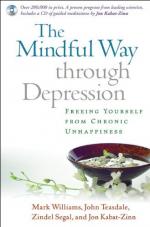|
This section contains 599 words (approx. 2 pages at 300 words per page) |

|
Depression is an illness caused by biochemical imbalance in the brain. It is characterized by persistent feelings of anxiety; sadness; helplessness; hopelessness; worthlessness; pessimism; guilt; restlessness; irritability; drastic loss of interest in pleasurable or routine activities; reduced sex drive; fatigue; difficulty concentrating, remembering, or making decisions; body aches not caused by physical illness; weight gain or loss; and often suicidal tendencies. In clinical depression, these and other negative emotions are out of proportion to the individual's life situation and can be so profound that the sufferer loses interest in life. In severe or prolonged depression, the individual may be unable to get out of bed for days and a time, and their ability to perform even the most routine activities is drastically impaired. Depressive illness differs drastically from the usual moods and emotions experienced by most people, such as sadness, "the blues", or grief after losing a loved...
|
This section contains 599 words (approx. 2 pages at 300 words per page) |

|


